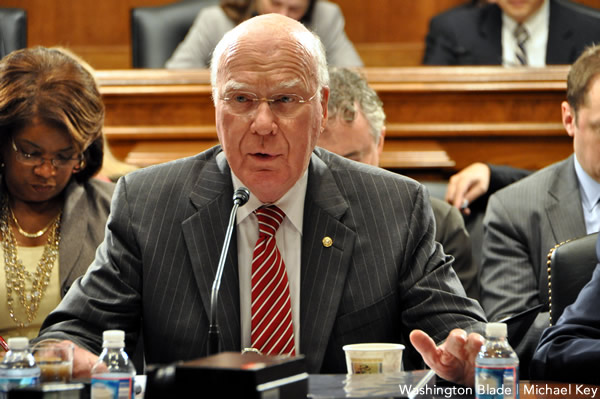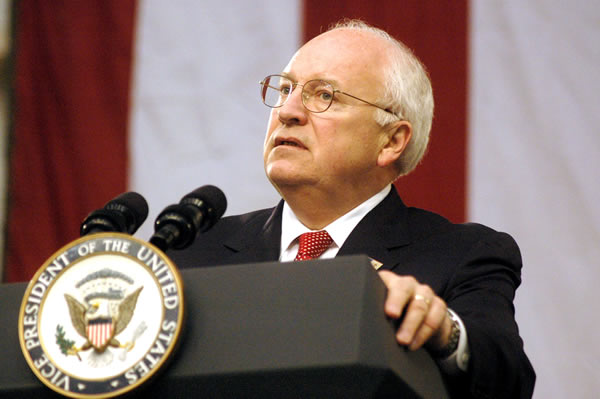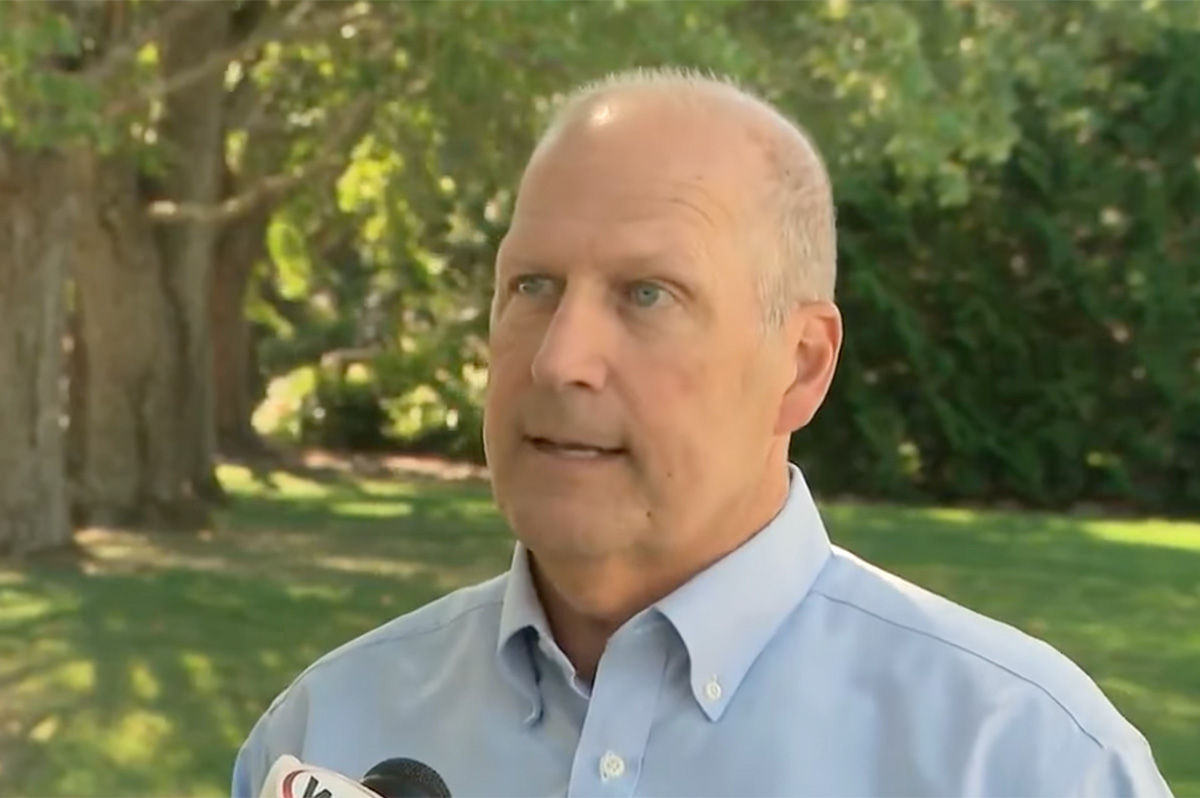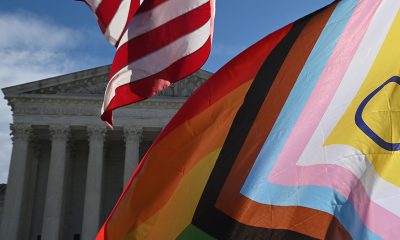Politics
LGBT advocates hope to amend immigration bill
‘Gang of Eight’ plan lacks provision for bi-national gay couples


Advocates are looking to Senate Judiciary Committee Chair Patrick Leahy (D-Vt.) to amend the immigration bill with UAFA. (Washington Blade photo by Michael Key)
The immigration reform proposal advanced by the “Gang of Eight” in the Senate is now public and lacks protections for bi-national same-sex couples, but plans are already underway to include the Uniting American Families Act at a later point during the legislative process.
On Tuesday, members of the bipartisan group working on comprehensive immigration reform unveiled a 19-page outline of the legislation that lays out components of the bill, including enhanced border security and a pathway to citizenship for the estimated 11 million undocumented immigrants in the United States.
The outline doesn’t mention the Uniting American Families Act, legislation that would enable gay Americans to sponsor their foreign partners for residency in the United States. LGBT rights advocates, speaking to the Blade on condition of anonymity, said staffers for Sen. Charles Schumer (D-N.Y.), a member of the “Gang of Eight,” informed them earlier this week the provision wouldn’t be included, which is consistent with earlier reporting from the Washington Blade.
Attention is now focused on Senate Judiciary Committee Chair Patrick Leahy (D-Vt.), the sponsor of UAFA, to see whether he’ll introduce the legislation when the committee reviews the “Gang of Eight” bill over the course of a process that’s expected to last weeks.
A Senate aide said Leahy still needs to review the final “Gang of Eight” legislation before announcing plans, but LGBT rights advocates say they’ve received assurances he’ll introduce UAFA as a committee amendment. Moreover, during a hearing on comprehensive immigration reform, Leahy expressed a commitment to including UAFA as part of comprehensive reform.
The amendment would almost assuredly pass if introduced in committee. The only two Democrats who aren’t co-sponsors on the committee are Assistant Majority Leader Richard Durbin (D-Ill.) and Sen. Dianne Feinstein (D-Calif.) — and they’re strong LGBT advocates in the Senate.
Steve Ralls, a spokesperson for the LGBT group Immigration Equality, said his organization has received assurances that UAFA will be amended in committee and all 10 Democratic members will vote in favor of it.
“They expect an amendment to be offered and they expect all their Democratic colleagues to vote in favor of that amendment,” Ralls said.
According to Ralls, Durbin had a phone call with constituents in Illinois earlier this week to talk about the immigration reform bill, and while the senator noted UAFA won’t be in the base bill, he gave assurances he and Schumer were expecting the opportunity to vote on the amendment in committee.
But the conservative makeup of the Republican members of the committee makes it unlikely UAFA will find bipartisan support. Members include Sen. John McCain (R-Ariz.) and Lindsey Graham (R-S.C.) who expressed disapproval over including UAFA as part of the bill. The only GOP co-sponsor of UAFA is Sen. Susan Collins (R-Maine), and she’s not a member of the committee.
Fred Sainz, vice president of communications for the Human Rights Campaign, said on the day the immigration bill is offered his organization will issue an action alert to members and supporters who live in states represented by a Judiciary Committee member asking them to call their senators to urge them to vote for UAFA.
It remains to be seen whether Republicans can find a way to disrupt the amendment process in committee so that UAFA would ultimately not be included.
Ralls said Immigration Equality is speaking to senators from both sides of the aisle to encourage both Democrats and Republicans to vote for the bill and will bring in couples from across the country next week to Capitol Hill to make the case.
“We’re not taking anything for granted,” Ralls said. “There will certainly be loud and vocal opposition from some on the committee. We expect that. We’re not taking the votes for granted until the votes happen, but I can tell you based on our conversations with senators on the committee — and even more importantly, the conversations that senators have had with their constituents about this issue — we’re feeling pretty good that we have the votes to be added in committee.”
Even if the Senate ultimately passes a comprehensive bill that includes UAFA, whether the Republican-controlled House follows suit remains to be seen. According to The Huffington Post, the House may not even pass a comprehensive bill because House Speaker John Boehner (R-Ohio) is considering breaking up the legislation and passing it in several installments.
LGBT rights advocates are pleased with other parts of the “Gang of Eight” bill. Ralls noted the outline includes an expedited pathway to citizenship for young, undocumented immigrants who would be eligible under the DREAM Act, many of whom identify as LGBT, and said he believes the bill will include a repeal of the one-year filing deadline for asylum speakers.
“That’s really critical for a lot of our clients,” Ralls said. “LGBT asylum seekers often do not know when they arrive in the U.S. that they have only one year to pursue asylum, and our legal team hears from many asylum seekers every year. You have really strong cases except they don’t meet they’re filing deadline, and that makes their case really tough.”

Former Vice President Dick Cheney died of complications from pneumonia and cardio and vascular disease, according to a family statement released Tuesday morning. He was 84.
Cheney served as vice president under President George W. Bush for eight years and previously as defense secretary under President George H.W. Bush. He also served as a House member from Wyoming and as White House chief of staff for President Gerald Ford.
“Dick Cheney was a great and good man who taught his children and grandchildren to love our country, and to live lives of courage, honor, love, kindness, and fly fishing,” his family said in a statement. “We are grateful beyond measure for all Dick Cheney did for our country. And we are blessed beyond measure to have loved and been loved by this noble giant of a man.”
Cheney had a complicated history on LGBTQ issues; he and wife Lynne had two daughters, Liz Cheney and Mary Cheney, who’s a lesbian. Mary Cheney was criticized by LGBTQ advocates for not joining the fight against President George W. Bush’s push for a constitutional amendment banning gay marriage. She later resumed support for LGBTQ issues in 2009, including same-sex marriage, after her father left office in 2009. She married her partner since 1992, Heather Poe, in 2012.
In 2010, after leaving office, Cheney predicted “Don’t Ask, Don’t Tell” would “be changed” and expressed support for reconsideration of the law banning open military service.
In 2013, the Cheney family’s disagreements over marriage equality spilled into the public eye after Liz Cheney announced her opposition to same-sex couples legally marrying. Mary Cheney took to Facebook to rebuke her sister: “Liz – this isn’t just an issue on which we disagree – you’re just wrong – and on the wrong side of history.” Dick and Lynne Cheney were supporters of marriage equality by 2013. Liz Cheney eventually came around years later.
Cheney, a neo-con, was often criticized for his handling of the Iraq war. He was considered one of the most powerful and domineering vice presidents of the modern era. He disappeared from public life for years but re-emerged to help Liz Cheney in her House re-election bid after she clashed with President Trump. Dick Cheney assailed Trump in a campaign video and later Liz announced that her father would vote for Kamala Harris in the 2024 presidential election.
New Hampshire
John E. Sununu to run for NH Senate seat
Gay Congressman Chris Pappas among other candidates

Former U.S. Sen. John E. Sununu on Wednesday announced he is running for retiring U.S. Sen. Jeanne Shaheen (D-N.H.)’s seat in 2026.
“Washington, as anyone who observes can see, is a little dysfunctional right now,” Sununu told WMUR in an interview the New Hampshire television station aired on Wednesday. “There’s yelling, there’s inactivity. We’ve got a government shutdown. Friends, family, they always say, ‘Why would anyone want to work there?’ And the short answer is it’s important to New Hampshire. It’s important that we have someone who knows how to get things done.”
Sununu, 61, was in the U.S. House of Representatives from 1997-2003 and in the U.S. Senate from 2003-2009. Shaheen in 2008 defeated Sununu when he ran for re-election.
Sununu’s father is John Sununu, who was former President George H.W. Bush’s chief of staff. Sununu’s brother is former New Hampshire Gov. Chris Sununu.
John E. Sununu will square off against former U.S. Sen. Scott Brown in the Republican primary. Gay U.S. Rep. Chris Pappas (D-N.H.) is among the Democrats running for Shaheen’s seat.
“As a small business owner and public servant, I’m in this fight to put people first and do what’s right for New Hampshire,” said Pappas on Wednesday on X. “I’m working to lower costs and build a fair economy. Washington should work for you — not corporate interests.”
Politics
Homophobia, racism, and Nazis: The dark side of rising Republican leaders
Leaked messages from young GOP leaders reveal normalized extremist rhetoric and internal party divisions.

The Young Republican National Federation (YRNF) — an organization dedicated to politically organizing young conservatives and helping them win elected office across the United States — is under fire after thousands of homophobic, sexist, racist, anti-Semitic, and violent Telegram messages from state-level group chats were leaked.
Politico reviewed nearly 2,900 pages of messages exchanged between January and August 2025 by members of state chapters of the YRNF, the youth wing of the Republican Party. Many of those involved in the chats currently hold or have held positions in state governments across New York, Kansas, Arizona, and Vermont.
Participants in the chats used racist, ableist, and homophobic slurs 251 times, according to Politico’s analysis. “Faggots,” “monkeys,” “watermelon people,” and “retards” were just some of the reported language used.
Within the leaked messages, at least six instances of explicitly homophobic language came from some of the youngest leaders in the Republican Party. Much of this rhetoric targeted Hayden Padgett, who recently won election as national chair of the Young Republicans. Padgett’s victory came after a bitter contest with Peter Giunta, the former chair of the New York State Young Republicans, who led an “insurgent” faction within the group and has been quoted most frequently in coverage of the leak.
Giunta, who was found to repeatedly say how much he “loved” Hitler in the group chat and used the N-word multiple times, was reportedly angry over losing the August election. He wrote messages such as “Minnesota – faggots,” referring to the state’s Young Republican organization, and “So you mean Hayden faggot wrote the resolution himself?”
Luke Mosiman, chair of the Arizona Young Republicans, responded with “RAPE HAYDEN” — later joking about Spanish colonizers coming to America and having “sex with every single woman.” Alex Dwyer, chair of the Kansas Young Republicans, replied, “Sex is gay.” Mosiman followed with, “Sex? It was rape.”
Bobby Walker, former vice chair of the New York State Young Republicans and former communications director for New York state Sen. Peter Oberacker, made at least two homophobic comments, including “Stay in the closet faggot,” and, in another message mocking Padgett, “Adolf Padgette is in the faggotbunker as we speak.”
William Hendrix, vice chair of the Kansas Young Republicans and former communications assistant for Kansas Attorney General Kris Kobach, was also a frequent participant, posting numerous racist and homophobic remarks — including, “Missouri doesn’t like fags.”
Joe Maligno, who served as general counsel for the New York State Young Republicans, said, “Can we fix the showers? Gas chambers don’t fit the Hitler aesthetic.”
There were multiple anti-Semitic dog whistles used, most notably Dwyer’s use of “1488” in the chat. The “14” references the 14 words in the white supremacist slogan, “We must secure the existence of our people and a future for white children,” while “88” is shorthand for “Heil Hitler,” with “H” being the eighth letter in the alphabet.
In response to the controversy Vice President J.D. Vance downplayed the leak, calling it an example of “kids doing stupid things” and “telling edgy, offensive jokes.”
Everyone mentioned in the group chat is over the age of 20. Peter Giunta is 31 years old, and Joe Maligno is 35. The ages of the other participants were not specified, but most accounts indicate they are over 24.
This leak exposes how some up-and-coming Republican leaders have normalized offensive and extreme rhetoric, reflecting both the erosion of political and cultural sensitivity and the influence of Trump and his allies. It also underscores the widening divide within the party between its traditional conservative wing and a far-right faction emboldened by such rhetoric.
-

 District of Columbia2 days ago
District of Columbia2 days ago‘Sandwich guy’ not guilty in assault case
-

 Sports2 days ago
Sports2 days agoGay speedskater racing toward a more inclusive future in sports
-

 Celebrity News4 days ago
Celebrity News4 days agoJonathan Bailey is People’s first openly gay ‘Sexiest Man Alive’
-

 Michigan4 days ago
Michigan4 days agoFBI thwarts Halloween terror plot targeting Mich. LGBTQ bars



















